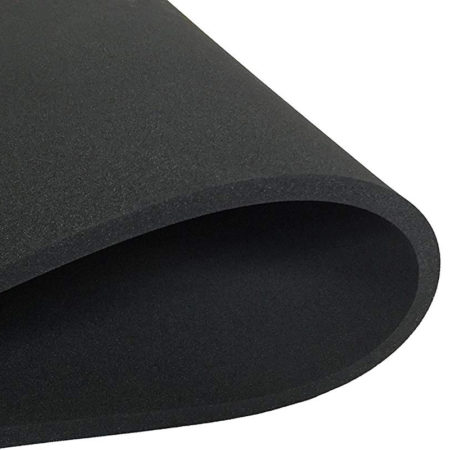Sponge Rubber Materials – Sealing & Cushioning Solutions

Sulphur Free EPDM

Neoprene Sponge Rubber (Medium Grade)

Neoprene Sponge Rubber (Firm Grade)

Semi Open Cell EPDM

EPDM Sponge Rubber (Medium Grade)

EPDM Sponge Rubber (Firm Grade)

Neoprene / EPDM Blend Sponge Rubber

PVC Nitrile Sponge Rubber

Open Cell Natural Industrial Sponge Rubber

Neoprene Sponge Rubber (FR Grade)

Viton Sponge Rubber

Poron Sponge Rubber

Natural Sponge Rubber
Silicone Sponge Rubber
Sponge Rubber
Here at Advanced Seals & Gaskets we offer a vast catalogue of non-metallic materials including various types of sponge rubber, sometimes also referred to as foam or cellular rubber. Our sponge rubber or ‘foam rubber’ materials depending on grade are manufactured in block (bun) form or which can be converted on-site using one of our many machines including one of many splitting machines, presses, bandsaws, slitters and log cutters. Our state of machinery enables us to split this master blocks and rolls down to thicknesses starting at as little as just 1mm, which can be further converted into one of many finished products including washers, gaskets, strips, sheets, pads and seals. Our facilities not only consist of a highly skilled workforce and specialist machinery, but also an in-house laminating service which not only allows us to laminate layers of sponge rubber to create greater non-standard depths, but also enables us to supply sponge rubber with a range of self-adhesives, foils and even layers of other materials to create composite.
What is Sponge Rubber?
Sponge or sponge rubber materials are usually a cellular version of its solid counterpart, but is manufactured using a foaming agent to create an air-filled structure, which is generally quite rigid and can be used for sound or impact dampening, popular for use in the production of seals, gaskets, protection foam, etc. Sponge rubber is available in two variants – open or closed cell. Closed-Cell sponge rubber will not allow air, dust or liquids to pass through its air pockets, whereas Open-Cell sponge rubber absorbs liquids and then traps them until they are compressed, however under compression provide an excellent seal.
Why use Sponge Rubber?
Sponge rubber materials are often used to fill gaps and irregularities between two surfaces and to provide a solution to unwanted rattles, noise, vibrations, to seal against air, gas, dust and liquids, and can also be used to cushion between moving parts to reduce friction and damage to components and equipment. Different types of sponge have their own unique set of characteristics and properties for use in various applications, some are suitable for outdoor use and UV/Ozone exposure, others have oil resistance or are flame retardant.
Sponge rubber components can be used in many applications and industries such as electrical equipment, automotive, aerospace, oil and gas, chemical industries and food/drink/pharmaceutical processing industries.
Different Grades of Sponge Rubber Roll Available
There are different types and grades of sponge rubber available for use within many industries each with their own unique characteristics. Popular types of sponge rubber include:
EPDM sponge rubber is a high quality material with excellent weathering, UV and ozone resistance, making it ideal for outdoor sealing. EPDM sponge rubber rolls offer a wide operating temperature range, acoustic, thermal and vibration dampening properties and also good mechanical strength and abrasion resistant properties. Grades of EPDM include medium, firm, high temp and semi open cell.
Neoprene sponge rubber is a versatile material, featuring good resilience and resistance to UV and ozone. It has a working temperature range of -40ºc to +115ºc, good chemical stability, and good general resistance to oils and petroleum-based fuels.
Silicone sponge is a resilient material with high temperature stability, chemically inert and waterproof. Silicone sponge is closed cell, available in a range of densities (firmness) it has a number of features which make it suitable for outdoor sealing including Ozone, UV resistance and temperature flexibility, meaning it will not freeze/crack.
Viton sponge is another closed cell variety of sponge rubber offered by ASG. It is manufactured with skin on both faces which increases its tear resistance. It has a wide working temperature range of -25°C to +204°C and good resistance to hydrocarbons, oils, fuels, lubricants, acids, weathering and ozone.
PVC Nitrile sponge is a closed cell, very soft type, manufactured with a smooth skin on both faces. This sponge rubber is often the preferred choice for use within thermal insulation applications due to its Class O flame retardant characteristics.
Poron sponge is closed cell polyurethane sponge rubber, which offers excellent compression resistance, good chemical resistance and longevity. This material is low out-gassing, non-fogging and will not become brittle and break down over time.
Industrial sponge rubber is a high quality, open cell natural sponge rubber. The open cell structure enables excellent compression recovery, but also to form around uneven surfaces, limited absorption and circulation of gas and liquids if required. Its is an excellent choice of material for us as protective sponge, expansion joints and anti-vibration applications.
Benefits of Sponge Rubber
Depending on the type and grade of sponge rubber taken, the material will offer a whole host of properties and benefits, some of which include:
- Sound/vibration Suppression
- Thermal Properties
- Bonded with other materials based on application
- Oils, chemical, acid, fuel resistance
- Ozone, weathering, UV resistance
- Wide working temperature range
Help with Cellular Sponge Rubber
If you would like to speak with a representative to discuss your specific application or requirements please call our sales office direct on 01384 469100, alternatively, you can send an E-mail. Simply click on the link and forward us your details along with your question and we will contact you immediately.
Material Enquiry
For more details use the form below or contact us on 01384 469100.
Material Specification
Full technical data can be supplied upon request,
or downloaded from our online portal.





















